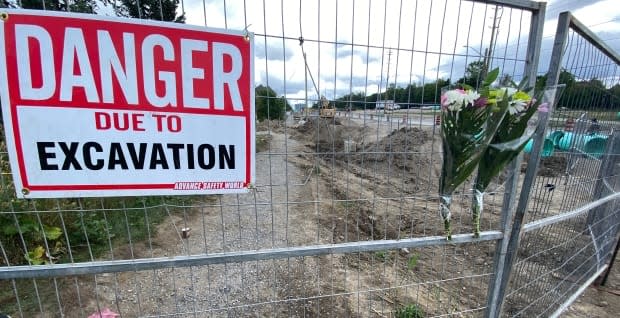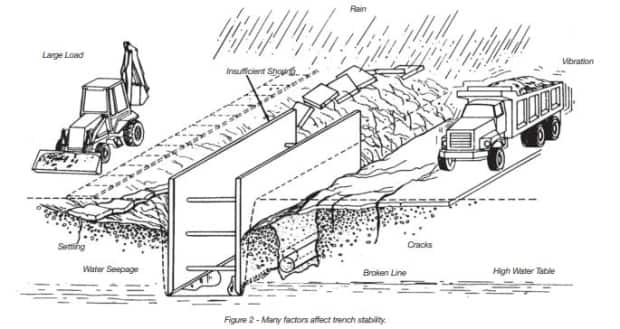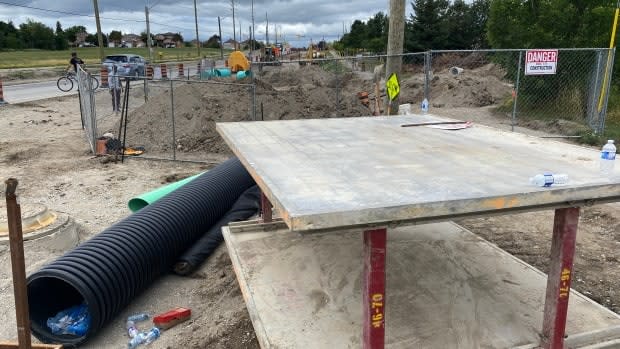Her brother was killed in a trench collapse. After 2 more such deaths, she's speaking out

It's been 12 years since Trish Penny's brother, Luke, died in a trench collapse while on the job in Whitby, Ont.
It was May 19, 2010, when Luke was working on a detached garage. A concrete wall caved in and collapsed on top of him, killing him almost instantly.
Penny said it was her brother's first day working on the project. He'd dug a trench along the perimeter of one side of the building and his job was to make sure the area was prepped and cleaned to apply weather proofing membrane.
More than a decade later, she is now relieving the pain of the families having to grief the loss of their loved ones after saying goodbye to them on the morning they headed to work, not knowing it would be their last time.
"Your immediate thought is 'This is horrendous,''How could this happen?' and then you're transported right back to that day and remembering when the police knock on the door and enter your house to tell you that somebody has passed away because they went to work that day."
On Monday, two workers died after a trench caved in on them at a job site in Ajax, Ont. Two others were injured in the collapse, which is now the subject of an ongoing investigation by Ontario's Ministry of Labour. But some, including Penny, say such incidents are entirely preventable.
"It's absolutely devastating and it's preventable," Penny told CBC Toronto.

How can trenching accidents be prevented?
On Monday night through to Tuesday morning, firefighters and crews used heavy excavating equipment, working through the night trying to recover the buried men, who worked for Direct Underground Inc. and the construction company Grascan Construction Ltd. Their bodies were retrieved at 2:30 a.m.
Excavation refers to a hole left in the ground as the result of removing material, while a trench is an excavation in which the depth exceeds the width.
While it is not known exactly what happened at the Ajax site that led to the deaths of the two workers, there are a number of measures to protect against cave-ins, says Enzo Garritano, CEO and president of the Infrastructure Health and Safety Association (IHSA). These measures include sloping, trench boxes and shoring, which are all designed to protect workers from the hazards of cave-ins when trenches are being used.

IHSA offers training to employers in construction, transportation and electrical utilities sectors around safety and compliance standards.
"In this case here, we really don't know what occurred at this point. Was it a collapse and they were outside[of] the trench or were they in the trench?" Garritano said.
An unstable trench can collapse, killing or injuring workers by suffocation or crushing when a worker is buried by falling soil, reads a message on the IHSA's website.
A trench box, typically used to reinforce the walls of the trench being dug, was seen at the site on Tuesday but it is unclear if it was being used at the time.
'Rules are there for a reason': Garritano
Since 2016, there have been three deaths involving trench collapses at work sites in the province, according to Garritano. The ministry could not confirm the figure in time for publication.
Garritano said the industry needs to act when deaths like this occur and can be prevented.
"When we think about the the rules and regulations, those are built on injuries, illnesses and fatalities. We can't forget those are rules are there for a reason," Garritano told CBC Radio's Metro Morning.
"They're there to protect workers, are there to protect people to get home every day. And that's that's the thing that we have to remember when we're putting those practices in place every day: utilize those practices, stick with them."

Anu Dhar, spokesperson for the Ministry of Labour, said health and safety inspectors will interview co-workers, supervisors, employers and anyone else the inspector determines may have relevant information or has witnessed the incident.
"The ministry's investigation includes, but is not limited to, examination of the incident location, any equipment involved, workplace policies and procedures, worker training history and records," Dhar said in a statement to CBC Toronto.
The ministry has strict requirements in place prohibiting workers from entering any excavation or trench unless they are met, Dhar said.
"This includes ensuring that all services are located and marked prior to excavation taking place, the excavation walls are either appropriately sloped in accordance with regulations or an adequate engineered support systems ... is in place to prevent the excavation or trench from collapsing on a worker," the statement reads.
"Barriers are in place preventing a worker from inadvertently walking or falling into an excavation or trench, adjacent structures are protected so that the excavation or trench does not impact their stability, and that the stability or the walls of the excavation or trench are not impacted by the placement of material or equipment."
LISTEN | Expert highlights dangers of trenches and measures to prevent accidents:
As for Penny, she says she will continue to call on workplace safety both in her personal and work life.
After being introduced to Threads of Life — a charity dedicated to supporting families after a workplace fatality, life-altering injury or occupational disease — Penny and her family began to share their story to bring awareness to the importance of health and safety at the workplace to help prevent incidents like these from occurring.
She said the incident threw her into the world of occupational health and safety, where she works as a health and safety professional.
Construction workers need to be informed about the dangers of the work they are involved in and to voice their concerns to supervisors if there are any, she says.
"You want to know what you're getting into and what is being done to protect you," Penny said.
"And if something's amiss or something doesn't feel right, you are protected by law to have those conversations."


